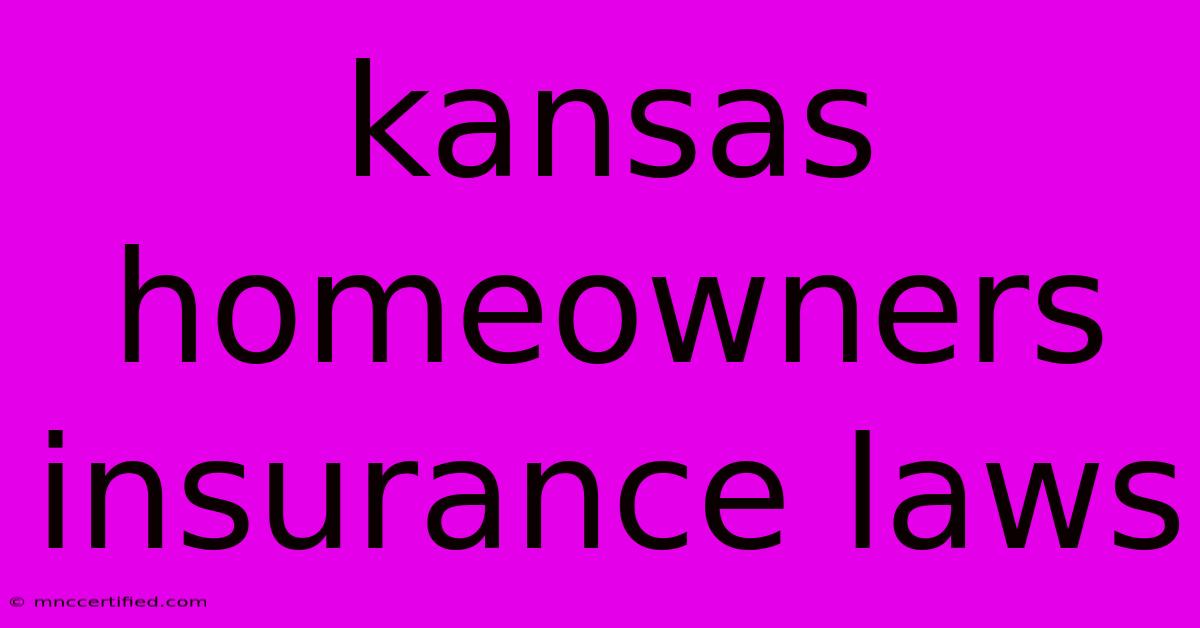Kansas Homeowners Insurance Laws

Table of Contents
Understanding Kansas Homeowners Insurance Laws: A Comprehensive Guide
Finding the right homeowners insurance in Kansas can feel overwhelming. This guide breaks down the key aspects of Kansas homeowners insurance laws, helping you navigate the process and secure adequate coverage for your property. We'll cover essential topics like coverage requirements, policy choices, and your rights as a homeowner.
What Does Kansas Homeowners Insurance Cover?
Kansas, like other states, doesn't mandate specific coverage amounts. However, understanding the standard components of a homeowners insurance policy is crucial. These typically include:
- Dwelling Coverage: This protects the physical structure of your home against damage from covered perils (e.g., fire, wind, hail). The amount of dwelling coverage should reflect the cost to rebuild your home, not its market value.
- Other Structures Coverage: This covers detached structures on your property, such as garages, sheds, or fences.
- Personal Property Coverage: This protects your belongings inside your home from covered perils. Consider scheduling valuable items like jewelry or electronics for increased coverage.
- Liability Coverage: This protects you financially if someone is injured on your property or you are held liable for damages to someone else's property. This is crucial for protecting your assets.
- Medical Payments Coverage: This covers medical expenses for guests injured on your property, regardless of fault.
Important Note: Standard policies typically exclude certain perils, such as flooding and earthquakes. You'll likely need separate flood insurance (often through the NFIP) and earthquake insurance for comprehensive protection.
Choosing the Right Homeowners Insurance Policy in Kansas
Kansas homeowners have several policy options:
- HO-3 (Special Form): This is the most common type, offering broad coverage for damage to your home and belongings. It covers most perils unless specifically excluded in your policy.
- HO-5 (Comprehensive Form): This offers the broadest coverage, protecting both your home and belongings against nearly all perils.
- HO-6 (Condominium Owner's Form): Designed for condominium owners, this policy covers your personal belongings and any alterations or improvements you've made to your unit.
- HO-8 (Modified Coverage Form): Often used for older homes or those with unique characteristics, this policy provides coverage based on the actual cash value of your property.
Selecting the right policy depends on your individual needs and the value of your property. Consult with an independent insurance agent to find the best fit for your situation.
Understanding Exclusions and Limitations
Remember that even the broadest policies have exclusions. Common exclusions include:
- Normal wear and tear: Routine maintenance issues are not covered.
- Intentional acts: Damage caused deliberately is generally not covered.
- Specific perils: As mentioned, floods and earthquakes are often excluded.
- Certain types of property: High-value items may require separate coverage.
Review your policy carefully to understand what is and isn't covered.
Kansas Homeowners Insurance and Your Rights
Kansas law provides certain protections for homeowners. Familiarize yourself with:
- Your right to cancel: You have the right to cancel your policy at any time, although you may incur penalties.
- Dispute resolution: If you have a claim dispute with your insurer, explore available dispute resolution options.
- Fair claims practices: Insurance companies are required to follow fair claims practices in Kansas. Knowing your rights ensures fair treatment in the event of a claim.
Finding the Best Homeowners Insurance in Kansas
Shopping around for homeowners insurance is crucial. Compare quotes from multiple insurers to find the best coverage at the most competitive price. Consider factors such as:
- Your credit score: Your credit score can impact your premium.
- Your home's features: Security systems and other safety features can lead to lower premiums.
- Your claims history: A history of claims can increase your premiums.
Working with an independent insurance agent can simplify the process and help you find the best policy for your needs. They can compare quotes from multiple insurers and provide expert advice.
This information provides a general overview. Always consult with an insurance professional or refer to the Kansas Department of Insurance website for the most accurate and up-to-date information regarding Kansas homeowners insurance laws and regulations. Remember to regularly review your policy to ensure it still adequately protects your home and belongings.

Thank you for visiting our website wich cover about Kansas Homeowners Insurance Laws. We hope the information provided has been useful to you. Feel free to contact us if you have any questions or need further assistance. See you next time and dont miss to bookmark.
Featured Posts
-
Airbnb Travel Insurance Worth It
Nov 21, 2024
-
Ellen Portias Uk Move Confirmed
Nov 21, 2024
-
Public Response To Jaguars Rebranding
Nov 21, 2024
-
Believe Brooks And Dunn Jelly Roll
Nov 21, 2024
-
Insurance Companies In Kalamazoo
Nov 21, 2024